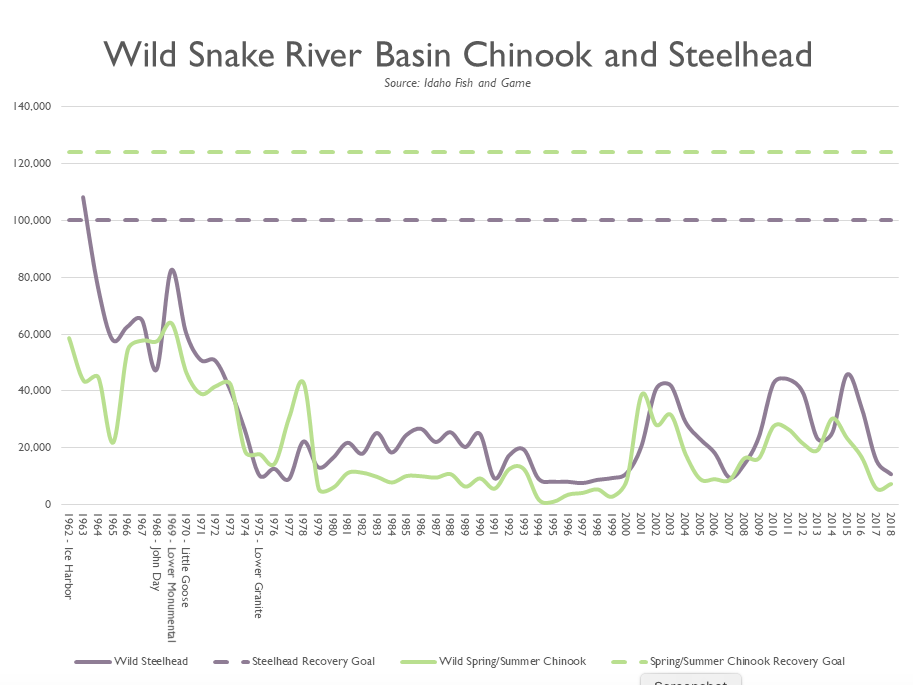forum
library
tutorial
contact

After 4 Years of Study, Feds Finally Decide
Whether to Tear Down Snake River Dams
by Annette Cary
Tri-City Herald, September 29, 2020
|
the film forum library tutorial contact |

|
After 4 Years of Study, Feds Finally Decide
by Annette Cary
|
"This selected alternative provides the best balanced and flexible approach to meeting the needs
of the human and natural environment in the basin, both now and into the future,"
-- Brig. Gen. D. Peter Helmlinger, commander of the US Army Corps of Engineers
 Federal agencies have adopted the conclusions of a four-year-long environmental study that rejected calls to tear down the four lower Snake River dams.
Federal agencies have adopted the conclusions of a four-year-long environmental study that rejected calls to tear down the four lower Snake River dams.
Instead, more water will be spilled over dams each spring in the Columbia River hydrosystem, which includes Snake River dams, to help juvenile fish heading downstream, as outlined in the management alternative that was ranked highest in the study.
The decision to adopt the alternative was made by the Army Corps of Engineers, Bureau of Reclamation and Bonneville Power Administration, which were in charge of the study.
"This selected alternative provides the best balanced and flexible approach to meeting the needs of the human and natural environment in the basin, both now and into the future," said Brig. Gen. D. Peter Helmlinger, commander of the Corps of Engineers' Northwestern Division.
"Our decision benefits the public interest, treaty resources and iconic fish species of the Pacific Northwest," he said.
BPA will pay for additional actions to protect endangered salmon and other wildlife.
The study was done after U.S. Judge Michael Simon rejected a 2016 hydropower management plan and said an environmental study for a new plan must consider breaching the dams from Ice Harbor near Burbank upstream to Lower Granite north of Pomeroy.
DECISION REACTION
The decision was criticized by groups that have advocated to breach the four lower Snake River dams with the goal of helping threatened salmon recover and also the Southern resident orca that feed on Chinook salmon.
"The Northwest can no longer afford to prop up a bloated welfare program for outdated dams that are destroying salmon runs and the jobs and communities that depend on them," said Tom France, Northwest regional executive director for the National Wildlife Federation.
"It's time for Congress to take charge and craft a comprehensive legislation package to restore the Snake River to create a healthy, intact river system that works for people, fish and wildlife," he said.
When the study results were released in late July, Reps. Dan Newhouse and Cathy McMorris Rodgers, both R-Wash., said that it found the "impacts of the federally owned and operated dams on our economy, environment, and protected species and came to the conclusion many of us recognize: The benefits of the dams along the mighty Columbia and Snake Rivers are far too precious for our region to go without."
Newhouse said Tuesday that the decision provides certainty to not only the ag industry, with farmers relying on barging to move their crops and some irrigation made possible by the dams, but also those who use clean and reliable power generated by the Columbia and Snake dams.
The decision came a year earlier than originally scheduled, after President Donald Trump ordered it to be made this year.
"I applaud President Trump and his administration for working collaboratively to support our federal water infrastructure, ensure reliable water supply and delivery, and develop a plan for the future," Newhouse said.
The Pacific Northwest Waterways Association praised the decision on Tuesday, saying the lower Snake River dams provide hydropower, navigation, irrigation, flood risk management and recreation for the region.
Their importance has been shown by the intense fires and marine habitat degradation driven by climate change.
"The clean power and efficient commerce provided by the system's hydroelectric dams and navigation locks are key to our region's ability to reduce our carbon footprint -- one of the most important steps in the fight against climate change," said Kristin Meira, of the Pacific Northwest Waterways Association.
learn more on topics covered in the film
see the video
read the script
learn the songs
discussion forum
